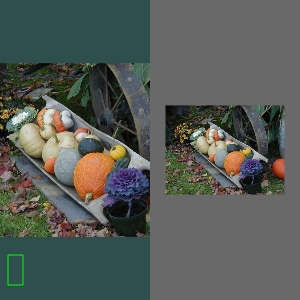ImageClip
Repository source: ImageClip
Description¶
This example loads an image into the left half of the window. When you move the border widget (the green square in the bottom left corner) over the image, the region that is selected is displayed in the right half of the window.
Other languages
See (PythonicAPI)
Question
If you have a question about this example, please use the VTK Discourse Forum
Code¶
ImageClip.cxx
#include <vtkBorderRepresentation.h>
#include <vtkBorderWidget.h>
#include <vtkCommand.h>
#include <vtkImageActor.h>
#include <vtkImageClip.h>
#include <vtkImageData.h>
#include <vtkImageMapper3D.h>
#include <vtkInformation.h>
#include <vtkInteractorStyleImage.h>
#include <vtkJPEGReader.h>
#include <vtkMath.h>
#include <vtkNamedColors.h>
#include <vtkNew.h>
#include <vtkProperty2D.h>
#include <vtkRenderWindow.h>
#include <vtkRenderWindowInteractor.h>
#include <vtkRenderer.h>
#include <vtkSmartPointer.h>
#include <vtkStreamingDemandDrivenPipeline.h>
#include <string>
namespace {
class vtkBorderCallback2 : public vtkCommand
{
public:
vtkBorderCallback2()
{
}
static vtkBorderCallback2* New()
{
return new vtkBorderCallback2;
}
virtual void Execute(vtkObject* caller, unsigned long, void*)
{
vtkBorderWidget* borderWidget = reinterpret_cast<vtkBorderWidget*>(caller);
// Get the world coordinates of the two corners of the box.
auto lowerLeftCoordinate =
static_cast<vtkBorderRepresentation*>(borderWidget->GetRepresentation())
->GetPositionCoordinate();
auto lowerLeft =
lowerLeftCoordinate->GetComputedWorldValue(this->LeftRenderer);
std::cout << "Lower left coordinate: " << lowerLeft[0] << ", "
<< lowerLeft[1] << ", " << lowerLeft[2] << std::endl;
auto upperRightCoordinate =
static_cast<vtkBorderRepresentation*>(borderWidget->GetRepresentation())
->GetPosition2Coordinate();
auto upperRight =
upperRightCoordinate->GetComputedWorldValue(this->LeftRenderer);
std::cout << "Upper right coordinate: " << upperRight[0] << ", "
<< upperRight[1] << ", " << upperRight[2] << std::endl;
const double* bounds = this->ImageActor->GetBounds();
double xmin = bounds[0];
double xmax = bounds[1];
double ymin = bounds[2];
double ymax = bounds[3];
if ((lowerLeft[0] > xmin) && (upperRight[0] < xmax) &&
(lowerLeft[1] > ymin) && (upperRight[1] < ymax))
{
this->ClipFilter->SetOutputWholeExtent(
vtkMath::Round(lowerLeft[0]), vtkMath::Round(upperRight[0]),
vtkMath::Round(lowerLeft[1]), vtkMath::Round(upperRight[1]), 0, 1);
}
else
{
std::cout << "box is NOT inside image" << std::endl;
}
}
void SetLeftRenderer(vtkSmartPointer<vtkRenderer> renderer)
{
this->LeftRenderer = renderer;
}
void SetImageActor(vtkSmartPointer<vtkImageActor> actor)
{
this->ImageActor = actor;
}
void SetClipFilter(vtkSmartPointer<vtkImageClip> clip)
{
this->ClipFilter = clip;
}
private:
vtkSmartPointer<vtkRenderer> LeftRenderer;
vtkSmartPointer<vtkImageActor> ImageActor;
vtkSmartPointer<vtkImageClip> ClipFilter;
};
} // namespace
int main(int argc, char* argv[])
{
vtkNew<vtkNamedColors> color;
// Parse input arguments.
if (argc != 2)
{
std::cerr << "Usage: " << argv[0] << " Filename(.jpg) e.g. Gourds2.jpg"
<< std::endl;
return EXIT_FAILURE;
}
std::string inputFilename = argv[1];
// Read the image.
vtkNew<vtkJPEGReader> jPEGReader;
if (!jPEGReader->CanReadFile(inputFilename.c_str()))
{
std::cout << "Error: cannot read " << inputFilename << std::endl;
return EXIT_FAILURE;
}
jPEGReader->SetFileName(inputFilename.c_str());
jPEGReader->Update();
int extent[6];
jPEGReader->GetOutput()->GetExtent(extent);
// xmin, xmax, ymin, ymax
// std::cout << "extent: " << extent[0] << " " << extent[1] << " " <<
// extent[2] << " " << extent[3] << " " << extent[4] << " " <<
// extent[5] << std::endl;
vtkNew<vtkImageActor> imageActor;
imageActor->GetMapper()->SetInputConnection(jPEGReader->GetOutputPort());
vtkNew<vtkRenderWindow> renderWindow;
vtkNew<vtkRenderWindowInteractor> interactor;
vtkNew<vtkInteractorStyleImage> style;
interactor->SetInteractorStyle(style);
vtkNew<vtkBorderWidget> borderWidget;
borderWidget->SetInteractor(interactor);
static_cast<vtkBorderRepresentation*>(borderWidget->GetRepresentation())
->GetBorderProperty()
->SetColor(color->GetColor3d("Lime").GetData());
borderWidget->SelectableOff();
interactor->SetRenderWindow(renderWindow);
// Define viewport ranges in normalized coordinates.
// (xmin, ymin, xmax, ymax)
double leftViewport[4] = {0.0, 0.0, 0.5, 1.0};
double rightViewport[4] = {0.5, 0.0, 1.0, 1.0};
// Setup both renderers.
vtkNew<vtkRenderer> leftRenderer;
renderWindow->AddRenderer(leftRenderer);
leftRenderer->SetViewport(leftViewport);
leftRenderer->SetBackground(color->GetColor3d("DarkSlateGray").GetData());
vtkNew<vtkRenderer> rightRenderer;
renderWindow->AddRenderer(rightRenderer);
rightRenderer->SetViewport(rightViewport);
rightRenderer->SetBackground(color->GetColor3d("DimGray").GetData());
leftRenderer->AddActor(imageActor);
leftRenderer->ResetCamera();
rightRenderer->ResetCamera();
vtkNew<vtkImageClip> imageClip;
imageClip->SetInputConnection(jPEGReader->GetOutputPort());
jPEGReader->UpdateInformation();
imageClip->SetOutputWholeExtent(jPEGReader->GetOutputInformation(0)->Get(
vtkStreamingDemandDrivenPipeline::WHOLE_EXTENT()));
imageClip->ClipDataOn();
vtkNew<vtkImageActor> clipActor;
clipActor->GetMapper()->SetInputConnection(imageClip->GetOutputPort());
rightRenderer->AddActor(clipActor);
vtkNew<vtkBorderCallback2> borderCallback;
borderCallback->SetLeftRenderer(leftRenderer);
borderCallback->SetImageActor(imageActor);
borderCallback->SetClipFilter(imageClip);
borderWidget->AddObserver(vtkCommand::InteractionEvent, borderCallback);
renderWindow->SetWindowName("ImageClip");
renderWindow->Render();
borderWidget->On();
interactor->Start();
return EXIT_SUCCESS;
}
CMakeLists.txt¶
cmake_minimum_required(VERSION 3.12 FATAL_ERROR)
project(ImageClip)
find_package(VTK COMPONENTS
CommonColor
CommonCore
CommonDataModel
CommonExecutionModel
IOImage
ImagingCore
InteractionStyle
InteractionWidgets
RenderingContextOpenGL2
RenderingCore
RenderingFreeType
RenderingGL2PSOpenGL2
RenderingOpenGL2
)
if (NOT VTK_FOUND)
message(FATAL_ERROR "ImageClip: Unable to find the VTK build folder.")
endif()
# Prevent a "command line is too long" failure in Windows.
set(CMAKE_NINJA_FORCE_RESPONSE_FILE "ON" CACHE BOOL "Force Ninja to use response files.")
add_executable(ImageClip MACOSX_BUNDLE ImageClip.cxx )
target_link_libraries(ImageClip PRIVATE ${VTK_LIBRARIES}
)
# vtk_module_autoinit is needed
vtk_module_autoinit(
TARGETS ImageClip
MODULES ${VTK_LIBRARIES}
)
Download and Build ImageClip¶
Click here to download ImageClip and its CMakeLists.txt file. Once the tarball ImageClip.tar has been downloaded and extracted,
cd ImageClip/build
If VTK is installed:
cmake ..
If VTK is not installed but compiled on your system, you will need to specify the path to your VTK build:
cmake -DVTK_DIR:PATH=/home/me/vtk_build ..
Build the project:
make
and run it:
./ImageClip
WINDOWS USERS
Be sure to add the VTK bin directory to your path. This will resolve the VTK dll's at run time.
